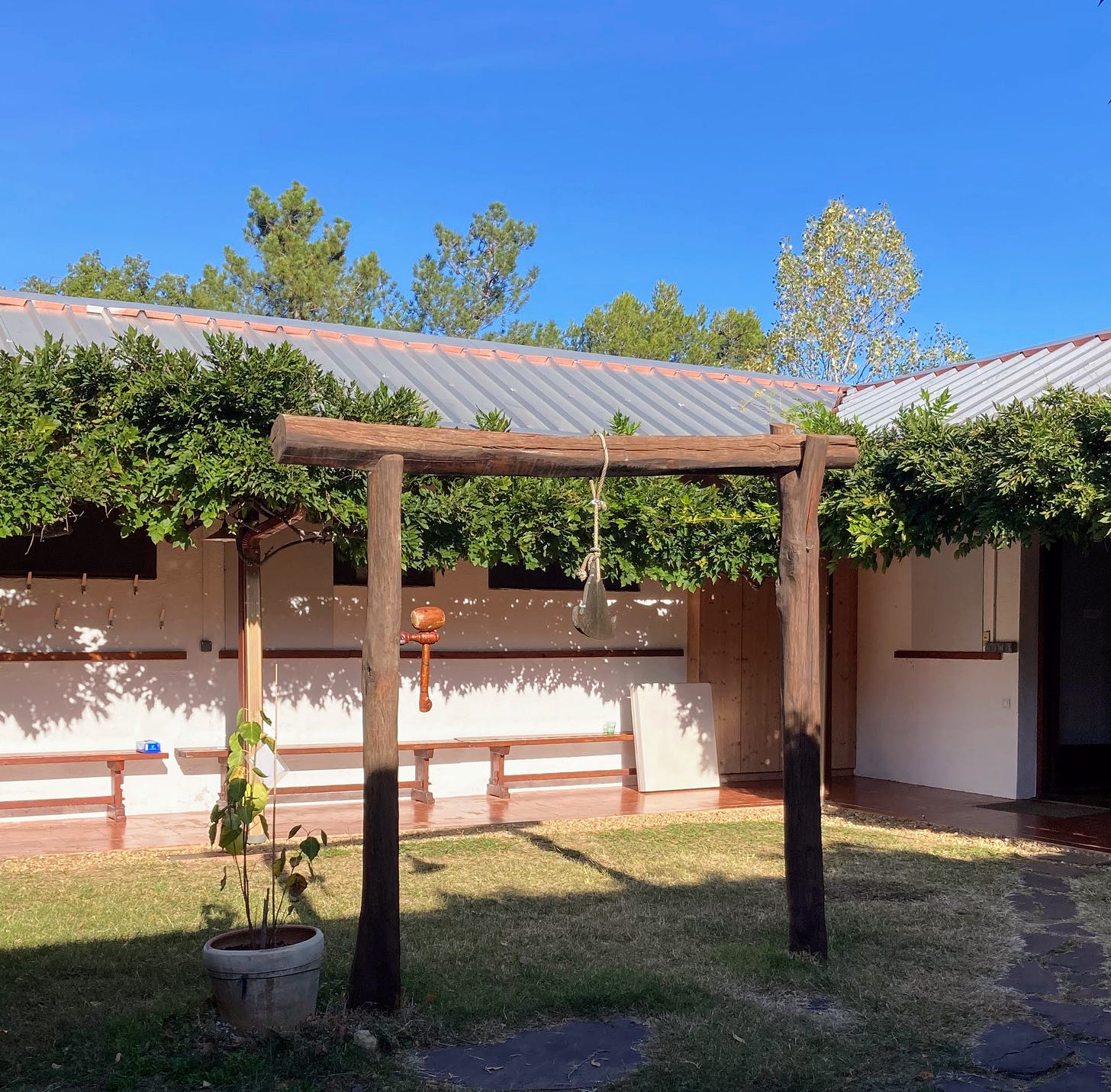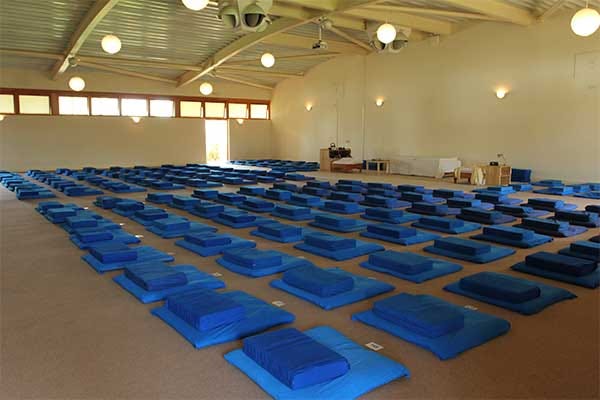How serving others taught me to put myself first
Unexpected learnings from volunteering at a meditation centre.
Sitting through my second Vipassana meditation course, I wondered, "I'm here 'only' meditating all day, and I'm so exhausted. How on earth can the servers manage to meditate and work simultaneously?"
This month I decided to find out…
For those unfamiliar with Vipassana, I suggest checking my previous article for a glimpse into the student's perspective.
What does it mean to serve on a course?
As a course server, you voluntarily engage in tasks like cooking, cleaning, or any other responsibilities at the centre—all while meditating four times a day and adhering to a code of conduct, mirroring the student experience.
With over 160 Vipassana centres worldwide, these facilities rely entirely on donations from past students and the voluntary efforts of servers, including administrators and managers. To contribute to spreading the teachings of Dhamma and the meditation technique, one can opt to serve, but this is only possible after completing the initial course.
People choose to serve for various reasons. I felt a sense of gratitude for being served in the past and a curiosity about an experience that could potentially strengthen me.
And it did strengthen me. In ways I hadn't anticipated.
The expectations vs. reality
After my first course, I naively expected a harmonious atmosphere each time I stepped into the centre. As a first-time server, I envisioned an environment steeped in meditation—devoid of conflicts, free from rush, and brimming with calmness, love, and peace.
Reality, however, had a different plan.
And that, perhaps, is the point.
Serving is both a physically demanding and mentally humbling experience. Your schedule is full from 6 am to 10 pm, filled with work responsibilities and a rigid meditation schedule. You share a room with other five people that you also work with. The assigned job might not align with your preferences, and collaboration with those you might disagree with is inevitable.
Much like real life.
Within the microcosm of the centre, you encounter everything—bruised egos, latent traumas surfacing under stress, personal biases, and your unhelpful thoughts and behaviours.
The difference lies in daily meditation and supportive management, providing the space and tools to pause, recall your purpose, and learn how to cope and respond.
It took me about three days to realize that the charged environment I found myself in unexpectedly was a significant part of my learning.
Bringing home the insights for real-life
Because no matter how much you meditate, what matters is how the practice transforms your thoughts, feelings and subsequent actions.
1. Be selfish. Put yourself first before helping others.
This is the message you hear from S.N.Goenka, the founder of the Vipassana meditation centers, at the beginning of your serving period. Be selfish. Initially counterintuitive for someone who comes to selflessly volunteer.
I realized it was a fundamental rule. For serving, and life.
How can you help others if you don’t know how to help yourself?
If you are feeling unwell, tired, or motivated negatively, you will share this with everyone else around you. Or, you will further harm yourself.
While the concept sounds straightforward, implementing it proves challenging, especially for individuals prone to overachievement, constantly proving their worth, or deriving purpose from being helpful—traits I recognize in myself. The boundary between necessary self-care and perceived 'laziness' becomes blurred.
The answer, I discovered through meditation, lies in self-observation. The more you scrutinize yourself, the clearer your understanding of what truly drives you becomes. Recognizing when to push selflessly and when to prioritize rest becomes easier.
Particularly in the microcosmos of the course, your general tendencies become much more apparent and if you are vigilant, you learn how to address them.
2. Many times it's just you. Not the external environment.
While we may believe that happiness requires altering our environment, the people around us, or our jobs, this holds true only to a certain extent. Often, we underestimate the influence of our internal perception on our overall well-being.
I come to a meditation centre and you think all your worries will be washed away. Instead, they come on the surface in a different shape or colour.
When I caught myself that I'm stressing out about whether the cake I baked for 80 people would be good enough in a similar way I got anxious about the success of my product initiative, it made me laugh.
Meditations in between work helped me to become much more aware of my thoughts, emotions and bodily sensations. This newfound awareness empowered me to slow down habitual reactions and respond in a way that was more beneficial for myself, and others as well.
3. Don't try to change others. Lead by example instead.
As in any other community, including meditators, you will find people that you disagree with. In times of conflict, our natural tendencies arise.
I remember one particular instance when a conflict arose and I wanted to jump in. But I caught myself before I said anything. I realised I was not here to share my opinions and educate others.
Instead, I wished both people well during my evening meditation and trusted that they would find their solutions. In the end, that's what we all came for.
And as the course progressed I noticed that many of the conflicts naturally resolved. Though all strangers, after 10 days we worked as a well-gelled team.
At the end of the course a coworker came to me and said, "Adela, I appreciate your calm and kind nature. It made such a difference for me. Thank you." I was surprised. I felt I hadn't done anything and this lady was thanking me.
Sometimes just being there with compassion and doing the best for yourself might prove to be the best you could do for others.
4. Focus on what you are doing. You might find it enjoyable.
My aversion to cutting onions is so intense that I typically stay away from recipes involving them.
Yet, in the context of cooking for 80 people during my service, onion cutting was unavoidable. I greatly appreciated a lady who usually took on the task with enthusiasm, allowing me to avoid it almost entirely.
However, the day arrived when I was asked to chop onions. Sighing, I carried the pile outside the kitchen to hide my struggle from others. The daunting quantity of onions left me wondering how I would endure it.
Drawing from my Vipassana practice, I decided to experiment and approach it as a meditation. Focusing on each movement of my hands, I observed the layers and watched the transformation of the onions into small cubes. I also took note of the sun warming my back and the gentle breeze on my face.
Surprisingly, by embracing the task with mindfulness, what seemed daunting turned into a pleasurable experience. No kidding. I might start to cook with onions. ;)
5. Big change lasts only so long. Tiny habits make the real difference.
Life-changing experiences, be it a Vipassana course or any significant event, often lead us to believe that our lives will be permanently transformed. The expectation is that we'll maintain an elevated attitude, and everything will magically become better.
In reality, we frequently overestimate the impact of such monumental shifts and underestimate the strength of small, consistent changes.
As a course server, you have the unique opportunity to learn how to blend the teachings and meditation practice into your daily life.
It's about cultivating resilience and calmness in the face of everyday challenges - whether it's the pressure of time before serving breakfast, unexpected mishaps like a dropped plate of carrots, or the chaos around you.
While you might not be accountable for the environment, you are responsible for how you respond to it.
What I want to keep reminding myself:
Meditate more. Anytime that is possible, one-minute sessions when feeling overwhelmed, two minutes at the beginning and end of meetings, practice awareness of thoughts and bodily sensations.
Forgive and wish others well, you are doing it for yourself.
Stepping off the train into the vibrant streets of Barcelona after the course, chaos and crowds hit me like a wave. Yet, I couldn't help but smile. Once again, I felt armed and ready to confront any challenges life might throw my way.
Exactly a week later, the wisdom and tools acquired during the course supported me through a hectic week of travelling across three countries, delivering a talk, while also managing work and studies.
Vipassana proved to be my anchor, again.
In closing, I share a wish echoing Goenka's voice in my mind:
May all beings be happy, be happy, be happy...
___
Adela <3
Pictures:
Vipassana Meditation Centre. Dhamma Neru, personal album
Vipassana Meditation Centre. Dhamma Dipa, https://uk.dhamma.org/more/photo-gallery/
Photo by Igor Frimmel
La Barceloneta, Barcelona, personal album







Also this: “Meditate more. Anytime that is possible, one-minute sessions when feeling overwhelmed, two minutes at the beginning and end of meetings, practice awareness of thoughts and bodily sensations.
Forgive and wish others well, you are doing it for yourself.”
In the end, what we define as meditation or not meditation is arbitrary ;)
Beautiful.
“If you are feeling unwell, tired, or motivated negatively, you will share this with everyone else around you. Or, you will further harm yourself.”